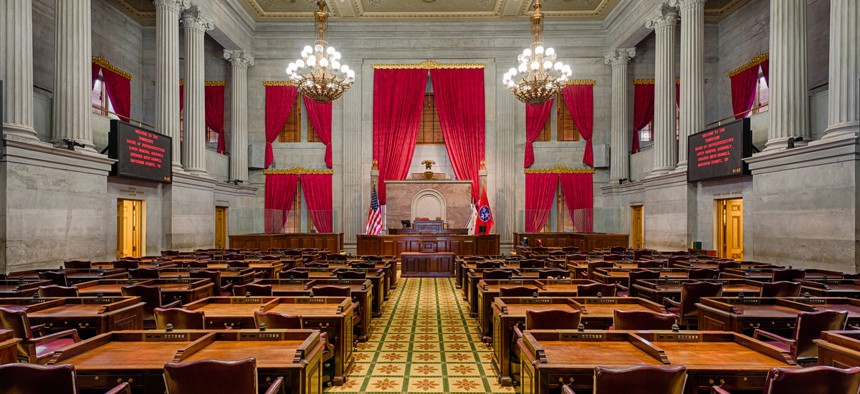Covid Response and Budget Basics at Forefront for States

House of Representatives Chamber in the Tennessee State Capitol building on December 1, 2014 in Nashville, Tennessee Shutterstock/ Nagel Photography
State governments are in a better financial position than initially thought, but pandemic-related initiatives will likely take up most of their time and resources this year, with more innovative lawmaking taking a backseat, experts said.
The coronavirus will continue to drive the work of state governments in the coming year, but most states will be better off financially than initially projected, helping with the cost of response efforts.
That’s according to a pair of state government experts who spoke during an online event hosted by Route Fifty on Monday. State legislative action this year is likely to be dominated by either the basic necessities—passing a budget—or coronavirus-related legislation and support rather than innovative policy agendas, said Tim Storey, executive director of the National Conference of State Legislatures.
Federal stimulus funding and strong online sales tax revenues are to thank for the more promising financial outlook this year, Storey and David Adkins, executive director of the Council of State Governments explained. “Looking ahead to fiscal 2022, the states are in a much better position than we thought they were going to be,” Adkins said.
States were buoyed by the fact that sales tax revenues, particularly from online sales, remained strong, Storey said.
A 2018 Supreme Court decision gave states the ability to collect more sales tax from online shopping, which grew in popularity over the course of the pandemic as brick-and-mortar stores closed and some people sought to limit their excursions outside the home.
While states with economies that depend on tourism and gas and oil production have suffered more than others, Storey said the horrific economic forecasts at the outset of the pandemic did not materialize.
States slashed expenditures early in the pandemic, but federal stimulus money provided to state governments through the CARES Act helped to offset the financial blow the virus dealt to public budgets, Adkins said. As the recovery continues, states aren’t out of the woods yet and appropriators remain cautious, he added.
As far as federal initiatives that could impact state governments, the biggest question mark hangs over whether or not Congress will pass another stimulus bill that directs money to state and local governments. The prior federal stimulus packages were a huge boost to local economies, Adkins said and with Democrats in control of the White House, Senate and House of Representatives, there is now a much better chance that state and local governments will be included.
Federal lawmakers have also touted a deal on infrastructure as a way to help the economy recover from the pandemic, but Storey said he is skeptical that infrastructure policy will get the attention many state and local leaders believe it deserves in Washington.
Andrea Noble is a staff correspondent with Route Fifty.
NEXT STORY: 'Systemic Buy-In:' How New Jersey Approaches Police Reform





